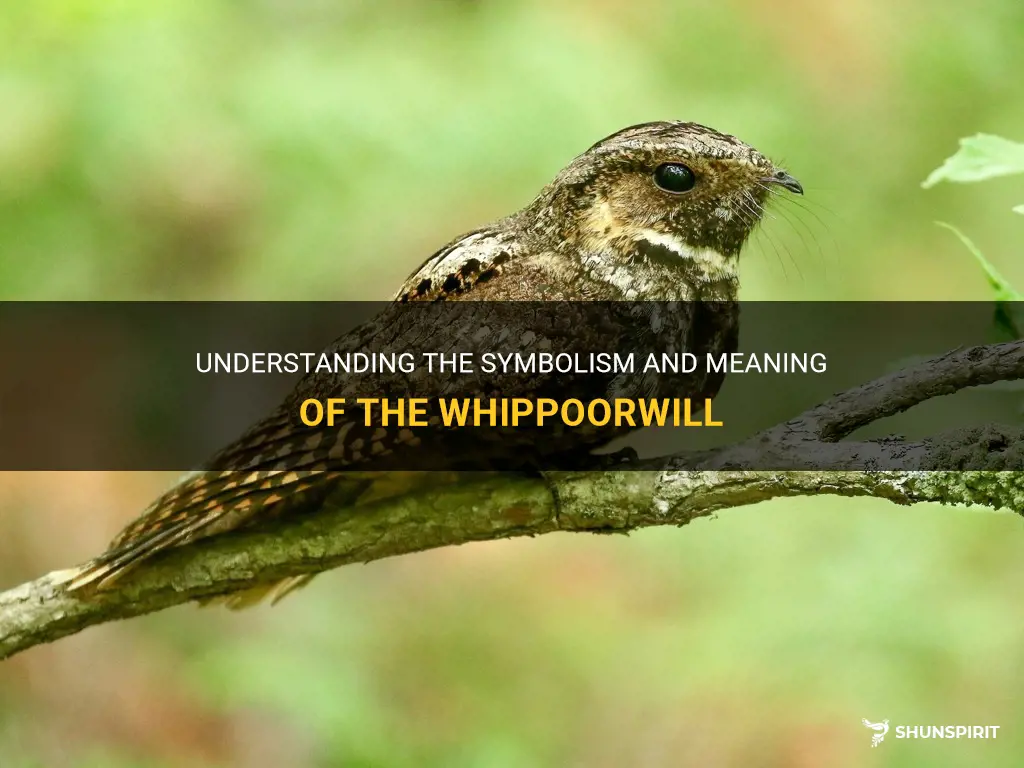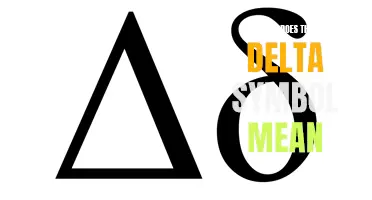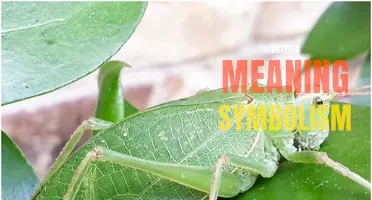
Throughout history, animals have often held a significant place in mythology, folklore, and cultural symbolism. One such creature, the whippoorwill, has captivated the human imagination for centuries. This small, nocturnal bird with its haunting call has become a potent symbol in various cultures across the world. From representing mystery and darkness to being a harbinger of death or a messenger of the supernatural, the whippoorwill's symbolism holds a powerful and enigmatic allure. So, join me on a journey to explore the meaning behind this enigmatic creature's symbolism and uncover the secrets hidden within its melancholic song.
What You'll Learn
- What is the cultural and historical symbolism behind the whippoorwill bird?
- In Native American folklore, what does the whippoorwill symbolize?
- How is the whippoorwill symbolically represented in literature and poetry?
- Are there any specific regions or cultures where the whippoorwill holds significant symbolic meaning?
- Can the whippoorwill symbolize different things in different contexts or cultures?

What is the cultural and historical symbolism behind the whippoorwill bird?
The whippoorwill bird is known for its distinct call, which gives rise to its name. This nocturnal bird is found in the eastern United States and Canada, and it has a rich history of cultural and historical symbolism. In many Native American tribes, the whippoorwill is considered a sacred bird and is often associated with various spiritual beliefs.
One common belief among Native American tribes is that the whippoorwill has the ability to communicate with the spirit world. It is believed that when the whippoorwill sings its mournful song at night, it is actually calling the spirits of the dead. This belief is particularly strong among the Cherokee, who believe that the call of the whippoorwill is a sign of impending death or a message from a deceased loved one.
In addition to its connection with the spirit world, the whippoorwill is also associated with luck and protection in some Native American cultures. The whippoorwill is believed to have the power to ward off evil spirits and bring good luck to those who hear its call. Some tribes even believe that wearing a whippoorwill feather can protect against evil forces. It is also believed that the whippoorwill can bring healing and restoration to those who are sick or suffering.
The whippoorwill also holds significance in folklore and literature. In many stories and poems, the whippoorwill is often portrayed as a symbol of loneliness or longing. Its haunting call is often associated with melancholy and loss. This symbolism is portrayed in Edgar Allan Poe's famous poem, "The Raven," where the narrator is tormented by the constant repetition of the word "nevermore," much like the whippoorwill's call.
Furthermore, the whippoorwill bird has been used as a symbol of the Appalachian Mountains and the rural way of life. The bird's distinctive call is deeply ingrained in the cultural fabric of the region, and it is often associated with the tranquility and natural beauty of the mountains. The whippoorwill's call can be heard echoing through the forests at night, creating a sense of connection to the land and its history.
In conclusion, the whippoorwill bird holds significant cultural and historical symbolism. It is revered by Native American tribes for its connection to the spirit world and its ability to bring luck and protection. In literature and folklore, it is often portrayed as a symbol of melancholy and longing. Additionally, the whippoorwill's call is deeply associated with the Appalachian Mountains, making it a symbol of the region's natural beauty and rural way of life. Overall, the whippoorwill bird is a fascinating creature that has captured the imaginations of many throughout history.
The Meaning Behind the Cross and Flame Symbol: A Powerful Emblem of Faith
You may want to see also

In Native American folklore, what does the whippoorwill symbolize?
The whippoorwill is a bird that holds great significance in Native American folklore. It is commonly found in North and Central America and is especially revered by many tribes for its symbolic meaning.
In Native American folklore, the whippoorwill is often seen as a messenger or an omen. Its unique call, which sounds like "whip-poor-will" or "whippoorwill," is believed to carry important messages from the spiritual realm.
One common belief is that the whippoorwill brings news of death. Its haunting call is said to foretell the imminent passing of an individual. In many Native American cultures, hearing the call of a whippoorwill is viewed as a sign that someone close to you will soon pass away. Some tribes even believe that if you hear a whippoorwill's call near your home, it is a warning that death will soon visit your family.
On the other hand, the whippoorwill is also associated with rebirth and renewal. Its ability to sing throughout the night, even during the darkest hours, is seen as a symbol of hope and resilience. In some Native American traditions, the whippoorwill is believed to bring messages of new beginnings and the opportunity for personal growth.
Additionally, the whippoorwill is sometimes seen as a guardian spirit or a guide. Its nocturnal nature and ability to navigate through the darkness have led some tribes to believe that the whippoorwill can help individuals find their way through difficult times. It is considered a loyal companion that offers protection and guidance to those in need.
The whippoorwill also holds cultural significance for specific tribes. For example, in Cherokee mythology, the whippoorwill is associated with fertility and is believed to be a protector of pregnant women and their unborn children. In other tribes, the whippoorwill is seen as a symbol of love and harmony.
In conclusion, the whippoorwill holds a special place in Native American folklore. It is often seen as a messenger, bringing news of death or new beginnings. It is also considered a guardian spirit and a symbol of hope and resilience. Whether as a bringer of sorrow or joy, the whippoorwill continues to be an important part of Native American tradition and belief systems.
Understanding the Symbols on Your AC Remote: Decoding Their Meanings
You may want to see also

How is the whippoorwill symbolically represented in literature and poetry?
In literature and poetry, the whippoorwill is often used as a symbolic representation of various themes and emotions. This bird, known for its distinctive call, has found its way into the works of many writers and poets, and its symbolism is wide-ranging.
One common symbolism of the whippoorwill is its connection to loneliness and solitude. The bird's mournful call is often associated with a sense of longing and isolation, and its presence in literature and poetry often reflects this. In many poems, the whippoorwill is portrayed as a companion to those who are alone, and its call is seen as a reminder of the melancholy that can accompany solitude.
Another symbol commonly associated with the whippoorwill is its connection to the natural world. This bird is often seen as a representative of the wild and untamed, and its call can evoke a sense of freedom and connection to the earth. In some poems, the whippoorwill is described as a messenger from nature, carrying its songs across the land and reminding humans of their place in the natural order.
The whippoorwill is also often used as a symbol of the passage of time and the fleeting nature of life. This bird is known for its nocturnal habits and its call is most commonly heard at night. In literature and poetry, the whippoorwill's call is often associated with the end of the day or the approach of darkness, serving as a reminder of the transience of life and the inevitability of death.
Additionally, the whippoorwill has been used as a symbol of mystery and the supernatural. Its haunting call and elusive nature have made it a subject of fascination and intrigue. In some works, the whippoorwill is portrayed as a harbinger of supernatural events or as a guide into the unknown. Its presence in these stories and poems adds an air of mystery and otherworldliness.
Overall, the whippoorwill is a powerful symbol in literature and poetry. It represents themes of loneliness, nature, the passage of time, and the mysterious. Its haunting call and distinct presence make it a perfect symbol for expressing these complex ideas. Whether used as a symbol of solitude or as a messenger of the natural world, the whippoorwill continues to captivate readers and poets alike with its rich symbolism.
Unlocking the Symbolic Meaning of the Venus Symbol Tattoo
You may want to see also

Are there any specific regions or cultures where the whippoorwill holds significant symbolic meaning?
The whippoorwill is a unique bird that holds significant symbolic meaning in various regions and cultures around the world. From ancient legends to modern folklore, this bird has captured the imagination of many and is often associated with different interpretations and beliefs. Although the whippoorwill's symbolism may vary across different cultures, there are a few regions where its meaning is particularly prominent.
One region where the whippoorwill holds significant symbolic meaning is in Native American culture, specifically among the Cherokee people. In Cherokee mythology, the whippoorwill is seen as a messenger from the spirit world. It is believed that when someone hears the call of the whippoorwill, it is a sign that a loved one who has passed away is near, bringing comfort and assurance. The bird is also associated with protection and is considered a guardian of the forest.
In addition to Native American culture, the whippoorwill is also highly regarded in Appalachian folklore. In this region, the bird is often seen as a harbinger of death or bad luck. The haunting song of the whippoorwill is believed to be an omen of impending doom or tragedy. According to the legends, if a whippoorwill lands near somebody's house and sings, it is believed that someone in the family will soon pass away. This belief has been passed down through generations and is still prevalent in some communities today.
Another region where the whippoorwill holds symbolic significance is in Caribbean folklore, specifically in Jamaica. In Jamaican culture, the whippoorwill is called the "duppy bird" and is associated with spirits and the supernatural. It is believed that the bird's call is a warning sign that spirits are present and that one should be cautious. The whippoorwill's call is considered eerie and is often associated with the supernatural world.
Overall, the whippoorwill holds significant symbolic meaning in various regions and cultures around the world. From Native American spirituality to Appalachian folklore and Caribbean beliefs, this bird has captured the imagination and inspiration of many. Whether seen as a messenger from the spirit world, a harbinger of doom, or a symbol of the supernatural, the whippoorwill continues to hold a special place in the hearts and minds of those who encounter its haunting call.
The Symbolic Power of Unity: Unveiling the Meaning Behind the Unity Symbol
You may want to see also

Can the whippoorwill symbolize different things in different contexts or cultures?
The whippoorwill is a small nocturnal bird known for its distinctive call, which sounds like "whip-poor-will." This bird is native to North and Central America and is often associated with folklore and symbolism.
In different contexts and cultures, the whippoorwill can indeed symbolize different things. Let's explore some of these interpretations:
- Loneliness and melancholy: In many Native American cultures, the whippoorwill is considered a symbol of loneliness and melancholy. Its mournful call is often associated with feelings of sadness and longing. In Cherokee mythology, the bird is associated with death and mourning.
- Wisdom and knowledge: In some cultures, the whippoorwill is seen as a symbol of wisdom and knowledge. Its mysterious nocturnal nature and its ability to navigate in the dark are seen as signs of wisdom and insight. Some Native American tribes believe that listening to the bird's call can bring forth spiritual guidance.
- Transformation and rebirth: In certain traditions, the whippoorwill is associated with transformation and rebirth. Its ability to undergo a complete molt and change its appearance is seen as a symbol of renewal and transformation. The bird's call at night is considered a reminder of the cycles of life and the potential for personal growth.
- Warning and death: In some folklore, the whippoorwill is seen as a harbinger of death or an omen of ill fortune. The belief is that if a whippoorwill calls near a person's home, it foretells the death of someone in the family or community. This interpretation has led to superstitions and fear associated with the bird in certain cultures.
- Spiritual connection and guidance: Across different cultures, the whippoorwill is often seen as a spiritual messenger or guide. Its call is believed to carry messages from the spirit world or the divine. Some believe that if a whippoorwill crosses your path or calls to you, it is a sign that you are being watched over and protected.
These are just a few examples of the different interpretations of the whippoorwill symbol across cultures and contexts. It's worth noting that the meanings attached to this bird can vary greatly depending on individual beliefs and cultural backgrounds. The whippoorwill's symbolic significance is not fixed and can be subject to personal interpretation.
In conclusion, the whippoorwill is a fascinating creature that holds various symbolic meanings in different cultures and contexts. From representing loneliness and wisdom to transformation and spiritual guidance, this elusive bird continues to capture the imagination and inspire awe in those who encounter it.
Understanding the Symbolic Meanings behind Navajo Sand Painting
You may want to see also
Frequently asked questions
The whippoorwill is often seen as a symbol of loneliness and loss in literature and culture. It is often depicted as a solitary bird, singing its mournful song in the dark of night. This imagery is used to represent feelings of isolation and sadness.
While the whippoorwill is commonly associated with negative emotions, it can also hold positive symbolism in certain contexts. In some Native American cultures, the whippoorwill is seen as a guardian spirit or messenger from the spirit world. It is believed to bring healing and guidance to those who encounter it.
The whippoorwill's call is distinctive and haunting, and it carries a sense of mystery and melancholy. In literature, it is often used to create an eerie or unsettling atmosphere. The call is also associated with the night and darkness, further emphasizing its symbolic connection to loneliness and loss.
Yes, the symbolism of the whippoorwill can vary across different cultures and regions. In Appalachian folklore, for example, the whippoorwill's call is believed to foretell death or misfortune. In contrast, some Native American tribes see the bird as a positive symbol of protection and spiritual guidance.
The whippoorwill's arrival and departure at certain times of year is often seen as a representation of the changing seasons and the passage of time. Its return in the spring can symbolize renewal and hope, while its departure in the fall can symbolize the passing of time and the approach of winter.







